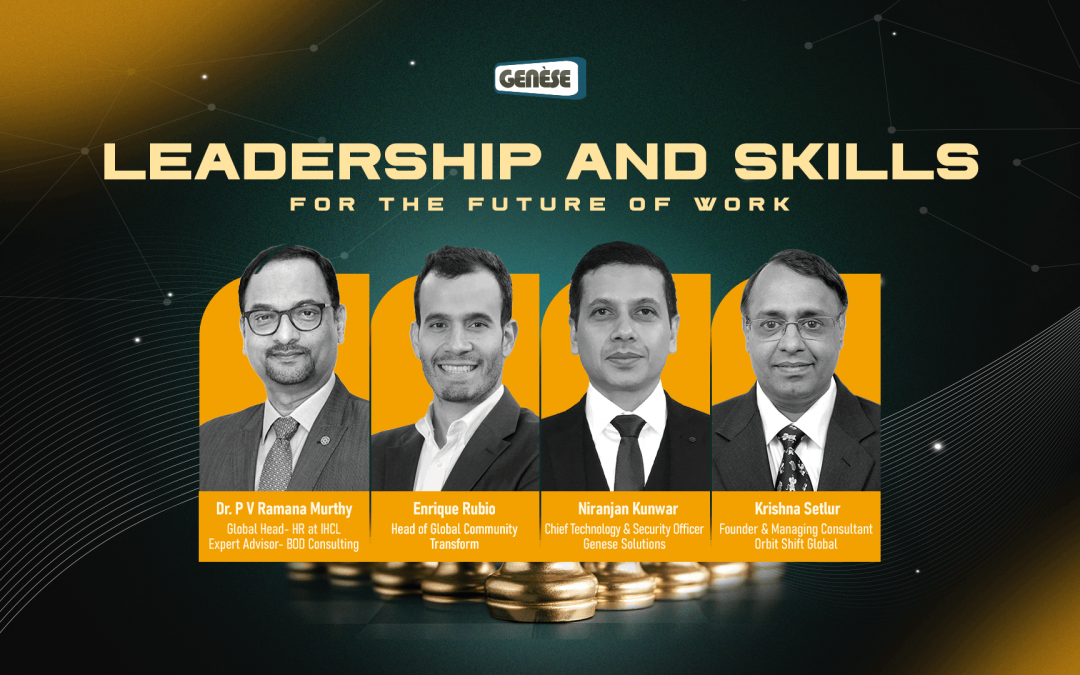Leadership and Skills for the Future of Work: Key Insights from Our Webinar
On October 28, 2024, we hosted a webinar titled “Leadership and Skills for the Future of Work,” where our expert panelists shared insights on the evolving dynamics of leadership in today’s fast-paced environment. Here are some highlights that resonated with attendees and offer practical takeaways for anyone looking to enhance their leadership skills.
Leadership Beyond Authority
Krishna Setlur, one of our panelists, kicked off the discussion with a powerful reminder: true productivity comes from empowerment, not authority. Think about the best teams you’ve been part of; chances are, they thrived on collaboration rather than coercion. Krishna’s concept of “Coach Leadership” encourages a culture of continuous learning and innovation.
Real-world data backs this up: research shows that companies that prioritize employee engagement see a 21% increase in profitability, according to Gallup. By promoting an environment where team members feel valued and empowered, organizations can drive not just productivity but also creativity. It’s time to ditch the micromanagement and start playing the role of supportive coach!
The Emotional Intelligence Advantage
Dr. P V Ramana Murthy, our second panelist, introduced an essential element into the conversation: emotional intelligence (EI). He noted that while IQ may plateau, EI can develop over time much like a muscle that strengthens with use. He referenced the Chilean mine rescue as a powerful example of how emotional intelligence can be a game-changer in high-stakes situations.
This event underscores the importance of empathy and communication under pressure. When leaders demonstrate emotional intelligence, they not only inspire their teams but also navigate challenges more effectively. A study from the World Economic Forum highlights that by 2025, emotional intelligence will be one of the top five skills employers seek. So, let’s flex those EI muscles!
Cultivating a Culture of Kindness
Enrique Rubio, our third panelist, emphasized that kindness in leadership is more than just a feel-good mantra; it’s a strategic advantage. He advocated for open communication and genuine conversations as critical elements for building trust and collaboration within teams. This is especially relevant in our hybrid work environments, which are on the rise, where connection can sometimes feel elusive.
Niranjan Kunwar added to this by discussing the need for organizational cultures that embrace empathy and reflection. Companies that foster such cultures not only see improved employee satisfaction but also lower turnover rates. Research shows that organizations with high empathy scores outperform their competitors by 20%. Who knew kindness could also be a bottom-line booster?
Skills for the Future: The 70-20-10 Model
As the conversation shifted to skills for the future, Enrique and Niranjan championed the 70-20-10 learning model. This model suggests that 70% of our learning comes from hands-on experience, 20% from interactions with others, and just 10% from formal education.
This approach aligns with today’s workforce reality, where practical experience and peer learning play a crucial role. So, next time you’re in a meeting, think about how much you can learn from your colleagues instead of relying solely on presentations or formal training. Real growth happens when we engage and learn from each other.
Embracing Humility in Leadership
Dr. P V Ramana Murthy introduced the APPLE framework, a refreshing and valuable approach! With components like Appreciative Mindset, Positive Possibilities, Path-Showing, Lightheartedness, and Evolution, this framework encourages leaders to embrace humility in their approach.
Humility in leadership is not just a nice-to-have; it’s increasingly recognized as essential for effective leadership. According to research from the Center for Creative Leadership, humble leaders attract more collaborative and innovative teams. Plus, everyone appreciates a leader who can admit they don’t have all the answers.
Conclusion: The Path Forward
As we wrapped up this insightful session, it became clear that the future of work will require leaders to adapt, empathize, and foster genuine connections. Our panelists provided invaluable insights grounded in real-world effectiveness.
At Genese, we believe in fostering a culture of continuous learning and development, which is why we regularly host webinars on trending topics and essential skills for the future of work. We encourage all of you to stay connected with us through our website and LinkedIn posts for updates on upcoming events. By engaging with our content, you not only enhance your professional growth but also help us strengthen our community, contributing to a more knowledgeable and empowered workforce.
On an ending note, thank you to everyone who participated and contributed to the discussions. Your engagement made this event a success!
Here’s to leading with authenticity, empathy, and a touch of humility as we embrace the future of work together!
 Finland
Finland Bangladesh
Bangladesh
